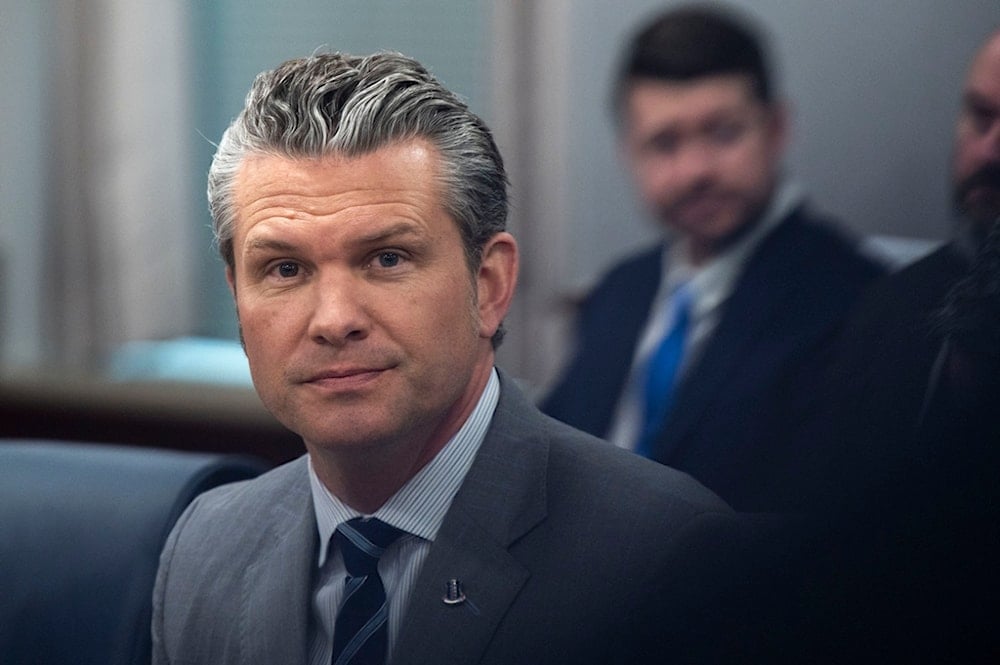Internal power struggles, leaks threaten Hegseth's tenure: WashPo
The atmosphere of mistrust has fueled wider speculation about whether Hegseth can continue leading the Pentagon effectively.
-

Defense Secretary Pete Hegseth meets with Polish Deputy Prime Minister and Minister of Defense Wladyslaw Kosiniak-Kamysz at the Pentagon, Tuesday, May 27, 2025 in Washington. (AP Photo/Kevin Wolf)
A widening internal rift within the US Department of Defense is raising alarms about the durability of Secretary Pete Hegseth's leadership, according to a report by The Washington Post, citing current and former defense officials. Behind a façade of unity, the department is reportedly mired in covert dysfunction, unresolved power struggles, and key vacancies that have left senior leadership fractured.
"There's a cold war that exists in between flashpoints... It's unsettling at times," one official familiar with internal dynamics told the paper.
Among the more visible flashpoints is a growing dispute between senior aides Eric Geressy and Ricky Buria. Geressy, a longtime associate of Hegseth and former soldier, has accused Buria, a senior adviser and former Marine, of deliberately marginalizing colleagues to position himself closer to the White House. Although Hegseth initiated a staff shakeup in April to restore cohesion, tensions persist.
The atmosphere of mistrust has fueled wider speculation about whether Hegseth can continue leading the Pentagon effectively.
Leadership Fractures
Responding to the turmoil, Chief Pentagon Spokesman Sean Parnell stated that "workforce adjustments are a natural and necessary feature of any highly effective organization," asserting that Hegseth "remains committed to ensuring the Department of Defense has the right people in the right positions to execute [US] President [Donald] Trump's agenda."
However, the dysfunction is only part of the story. Hegseth is also facing intense scrutiny over the expanding "Signalgate" controversy. According to The Wall Street Journal, the Pentagon's inspector general has widened its investigation into Hegseth's alleged mishandling of sensitive military communications. A second Signal chat, involving Hegseth's wife, brother, aides, and others, was reportedly created before his January confirmation and remained active after he took office. One exchange reportedly discussed plans for a March airstrike.
Signal Fallout
The scandal gained public attention in March when The Atlantic's editor-in-chief, Jeffrey Goldberg, revealed that he was accidentally added to a Signal group by then-National Security Advisor Mike Waltz. The chat included senior administration officials, among them Hegseth, Secretary of State Marco Rubio, and Vice President JD Vance, and contained messages discussing pending strikes on Houthi positions in Yemen.
In response to the leaks, Hegseth implemented stricter controls on press access at the Pentagon, requiring journalists to sign confidentiality agreements and restricting access to key areas. These measures have been criticized by the Pentagon Press Association as a threat to transparency and a violation of press freedom.
Despite these developments, Hegseth's position remains secure for now. Timothy Kneeland, a professor at Nazareth University, told RIA Novosti that Hegseth is unlikely to be ousted in the near term, thanks in large part to the administration's "strenuous defense." Still, Kneeland noted that if further scandals emerge, Deputy Secretary Stephen Feinberg, who previously worked with Trump during his first term, would likely be tapped as his replacement.
Read more: White House to decide Pentagon Chief of Staff, bypassing Hegseth
While the Pentagon reels from internal strife and reputational damage, the growing unease signals deeper institutional instability at one of the US government's most critical agencies.

 3 Min Read
3 Min Read








